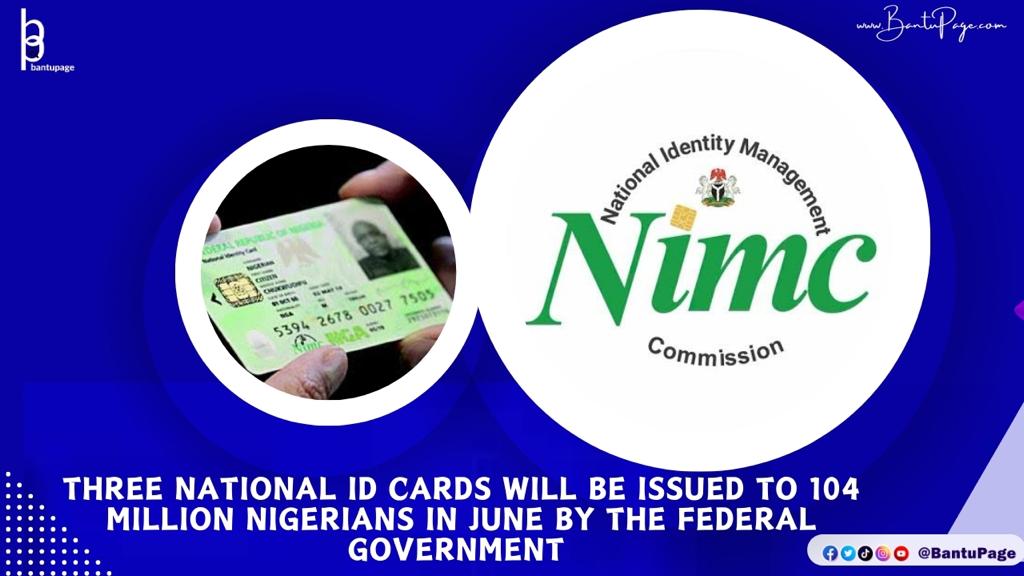
An ECOWAS National Biometric Identity Card, a social intervention card, and a bank-enabled National ID card are the three new national identity cards that the National Identity Management Commission plans to introduce.
The Identity Commission has announced its intentions to introduce a national identity card with multiple functions. The identity solution could facilitate payment for a variety of financial and social services, according to the announcement. On April 8, 2024, Ayodele Babalola, the Technical Adviser, Media, and Communications to the Director-General of the National Identity Management Commission, assured that Nigerians would start getting the three national ID cards within one or two months of the launch in May, subject to the approval of the Presidency.
Babalola stated, “We expect the bank-enabled National ID to meet the needs of the middle and upper segments who typically use banks within the next one or two months after launch. Also, activation of the National Safety Net Card to meet the urgent needs for authentication and a secure platform for government services such as palliatives within the next one or two months. The focus will be on the 25 million vulnerable Nigerians funded by the current government intervention programmes. Digital or virtual versions of all cards will be available for individuals who prefer digital formats, albeit with limited functionalities. Additionally, ECOWAS cards will be issued on an as-needed basis in collaboration with the Nigerian Immigration Service,” he added.
As Babalola laid out in a recent interview, the new card would do more than just replace paper IDs; it would also facilitate access to public and private social services, level the playing field for economically disadvantaged Nigerians, give people more agency, and inspire more people to get involved in developing the country. He mentioned that by the end of December 2023, the commission aimed to have distributed the cards to 104 million qualified applicants on the national identification database.
He stated, “We shall be implementing the following programmes to revive the general multipurpose card issuance: the first is the bank-enabled national ID card in collaboration with NIBSS and banks, while the second programme will be a social intervention card under the National Safety Net Card. The third rollout will be an optional ECOWAS National Biometric Identity Card. We are looking at May for the possible launch, but that is also subject to presidential approval. It is just to finalise some very important details. The project will be powered by AfriGo, which is under the central bank, but everything stops at the table of the president.”
He further stated that “On our part, we have done the needful, but we also have to wait for the necessary permission. It is going to be three different cards; one would be for the smooth process of palliative distribution and social safety programmes. There will be another one that is bank-enabled, and people will have the choice to choose based on their needs. Persons without bank accounts will also be able to use it, as will persons living with disabilities.
“The National E-ID card can function as a debit and prepaid card for both banked and unbanked individuals using biometric authentication, such as fingerprint and picture, to aid identity verification. Its offline capability enables transactions in areas with limited network coverage. The back of the card has banking information, including a chip and pin as well as a magnetic stripe.
“While the National Safety Net Card will be enabled for identity and used for all government interventions and services across multiple ministries, departments, and agencies. Among other capabilities and functionalities, this card will be enabled for the eNaira in compliance with operational and security standards and interoperable with the existing payment system. The card will be used for all government social programmes, including cash transfers, agricultural loans, student loans, health insurance schemes, micro contributions, micro pensions, etc., with a validity period of 10 years. It will be issued based on the government programmes and existing social register. This will enable real access through electronic money, not cash, and uplift 133 million people out of poverty.”
He, however, stated that “We expect the bank-enabled National ID to meet the needs of the middle and upper segments who typically use banks within the next one to two months after launch. Also, activation of the National Safety Net Card to meet the urgent needs for authentication and a secure platform for government services such as palliatives within the next one or two months. The focus will be on the 25 million vulnerable Nigerians funded by the current government intervention programmes.
“Digital/virtual versions of all cards will be available for individuals who prefer digital formats, albeit with limited functionalities. Additionally, ECOWAS cards will be issued on an as-needed basis in collaboration with the Nigerian Immigration Service.”
According to Babalola, the commission will promptly activate the bank-enabled National ID within one to two months of its unveiling in order to cater to the demands of the middle and upper sectors. This development, however, has elicited reactions from IT experts and others.
By Chidimma NWAFOR





